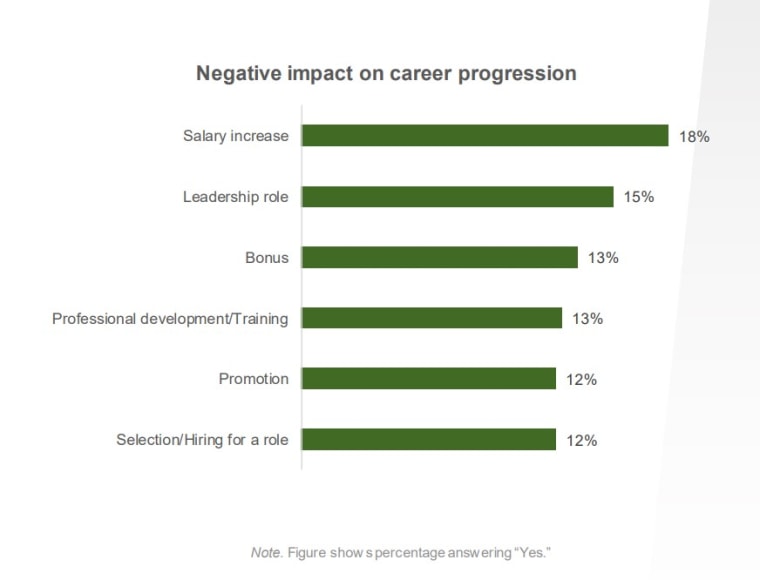Over one million women in the United States experience menopause each year, and many find the symptoms associated with it disrupts their work performance. Yet, most women don’t feel supported at work when it comes to their perimenopause/menopause needs.
That was one big takeaway from a new report by Korn Ferry Institute, in partnership with Vira Health. The study surveyed over 8,000 women globally to better understand the role of perimenopause and menopause in the workplaces.
The study found approximately 47 percent of women experienced menopause-related symptoms – like hot flashes, insomnia, brain fog and depression – that “sometimes” to “consistently” disrupted their daily lives. Yet, when asked about support, less than 40 percent said they received it, with the greatest support of support coming outside of work. And only 26 percent of women said they received support from formal work policies or programs.
“If you put this picture together, you have a lot of women who are at likely at an age where they are reaching the pinnacle of their careers – yet many are having their lives disrupted by symptoms of menopause and not receiving adequate support,” Tessa G. Misiaszek, head of research for the Korn Ferry Institute. “Layer on family stressors from aging parents and young adult children, and it is a lot to overcome and still have a highly productive career.”
Know Your Value recently chatted with Misiaszek about the study, how employers can better support women going through menopause in the workplace and more. Below is the conversation, which has been edited for brevity and clarity:
Know Your Value: You found that women in senior leadership were particularly impacted. How did the negative effects of going through peri/menopause related symptoms in the workplace carry over to career progression outcomes, like promotions and bonuses?
Misiaszek: First, we were a bit surprised by the response we received to the question regarding how many days in a given month did survey respondents missed work due to peri/menopause symptoms. We learned that 19 percent of respondents missed a week or more in a given month. And when we asked participants have they quit their job due to peri/menopause, 13 percent said they had and another 15 percent are considering it. Therefore approximately one in four women have quit their job or are considering it and 44 percent of those women are senior leaders or senior executives.
This illuminates a really big issue for women, who may likely be at the most productive point of their career, needing to take time off due to peri/menopause, which in turn may interrupt their progression to the C-suite. And while far fewer respondents to the survey who are “front line workers” or “first line managers” quit their jobs due to peri/menopause – we can surmise that perhaps there were other pressures that kept them at work even if they were not feeling well, whereas women who were in executive roles may have had the financial means to take time off work. The intersectionality of this issue and how it impacts women at work differently is an area we would like to further explore.
We also asked whether women felt they experienced a negative impact on their career progression due to menopause, from negatively impacting a salary increase to promotion to receiving a bonus. At least 12 percent to 18 percent of participants surveyed reported a negative impact across all the factors we inquired about, with approximately 41 percent in total reporting at least one negative impact on their career.

This is such an important piece of data because we can start to ascertain that the negative impacts on career progression due to menopause may be contributing to the overall lack of progression women have made ascending to the C-suite and achieving pay equity. While there are a lot of factors including systemic bias that inhibits a women’s progression in her career – the really interesting question we have from this data is: Could we start to make some improvement on gender equity at work, if women are properly supported during this life transition of peri/menopause?
Know Your Value: The study found most women do not feel supported at work around their perimenopause/menopause needs. Obviously, supporting women with menopausal symptoms can have a positive impact on both employee well-being and retention. So how specifically can employers support women going through menopause in the workplace?
Misiaszek: That’s a great question. In our survey we asked about the wide range of symptoms women experienced that affected work performance from physical symptoms like difficulty sleeping to psychological symptoms like difficulty concentrating to vasomotor symptoms like hot flashes to urogenital symptoms – all of which 30 percent to 61 percent of participants reported experiencing some of these symptoms.
As a result, ideally employers need to consider a multi-pronged approach to supporting women entering and going through this life transition from healthcare benefits to flexibility with work location, to having a way for women to request support as needed with the hope that if they are considering quitting, that their employers can be aware and help to support them.

However, before an employer can start to address this issue – we have to create awareness for how peri/menopause impacts women at work. It is an issue that is incredibly under-recognized, and our hope is that through this research, we can start to illuminate the negative impacts so employers, healthcare providers, and other forms of support can emerge to help everyone affected.
Know Your Value: The study also found that respondents did not communicate their perimenopause/menopause experiences at work with their managers, HR functions, and/or senior leadership. Is this because women feel uncomfortable broaching the subject?
Misiaszek: While it varies from 37 percent who communicated about their experience with peri/menopause with HR to 42 percent spoke with their line manager, when asked if they felt supported by their manager, only 32 percent reported they did. This discrepancy in the data highlights that while women are willing to speak with someone (70 percent spoke with work colleagues), but if they don’t get support – it might be because managers feel ill-equipped in knowing what the right response should be.
It begins with recognizing this life transition women experience can negatively impact their work and bringing awareness to how women are impacted, which might allow more women to share their experiences and seek help rather than suffer in silence. In addition, working on communications and inclusive leadership training for managers and team leaders will help to develop a culture of trust and transparency.
Know Your Value: What do you think is the future of menopause-specific benefits in the workplace, especially as companies try to keep existing employees, recruit new talent and stand out from competitors? Are there any companies that are doing this well?
Misiaszek: I am very hopeful that as we continue to discuss and illuminate the realities of how peri/menopause impacts women at work – more and more menopause-specific benefits will be made available in the workplace. When the Korn Ferry Institute was beginning this research, we did go straight to our CHRO and global head of benefits to first, let them know we were doing this, but to also learn more what Korn Ferry is doing. And I am really proud to report they have made menopause-specific benefits available to women at our company. In addition, our research partners, Vira Health, also work with employers to bring education and clinical support.
But as more awareness around this issue is developed – it will be important to build inclusive strategies into talent management processes – both from a structural to programmatic level to help women report biases they may feel, to seek flexible work arrangements, and for managers to be better equipped to have meaningful conversations on the topic with their teams. By doing so, we might be able to support all women – from front-line employees to those ascending to the C-suite to continue to have productive careers while feeling healthy and strong.

